
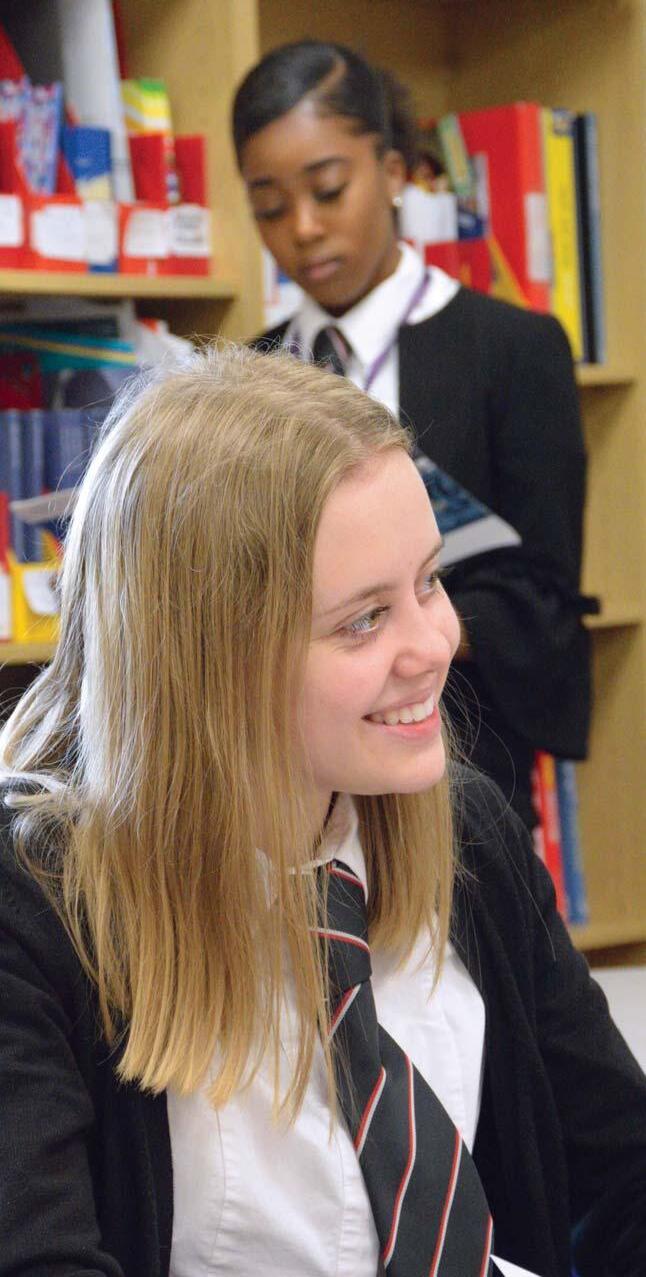



I am delighted that you are considering an application for Davenant Sixth Form.
Davenant is such an exciting and vibrant Sixth Form with a varied academic curriculum that provides students with the necessary qualifications and experience to progress to top universities, high quality apprenticeships and employment opportunities.
Davenant has a long-established tradition of success at A Level with students gaining some of the best results in the county. Those who join the school in Year12 quickly integrate with those who have come through the school.
Together they form teaching and social groups that go on to achieve great things in their academic and extra-curricular programmes. We are a school whose values are based on a strong, Christian ethos.

However, we welcome into our Sixth Form students of all backgrounds, some from other faiths and others with no particular religious affiliation.We simply ask that our students embrace the opportunities offered and present themselves as aspirational young people who will maintain our standards of excellence.
The Davenant Sixth Form offers fresh challenges to students who already have achieved well up to Year11.Experienced teachers, high quality pastoral care and informed careers guidance ensure students make progress of which we can all be proud. The opportunities outside of the classroom are extensive with an array of clubs andtrips that broaden the Sixth Form experience.
I do hope you find this prospectus helpful and that you will feel encouraged to apply for a place in our Sixth Form.
MrAdamThorne Headteacher
I am proud to welcome you to Davenant Sixth Form, which has been graded as providing outstanding provision by Ofsted in our recent inspection in Sept 2021.
The high quality teaching and subject knowledge of staff, the incredible post-18 outcomes and the variety of enrichment opportunities on offer to our students, were particularly highly praised in our report.
To quote a student who reflected the views of many when speaking to the Inspectors, ‘the school is beyond expectations.’
I am regularly impressed by the behaviour and courteous manner of our students as they work through what is invariably a challenging two years of A Level study. During this time they will be supported throughout by a dedicated and strong pastoral team including,myself, two Heads of Year, a Sixth Form Manager, a Careers Leader, a Careers Co-ordinator, our team of Librarians and Sixth Form Tutors.
We ensure there is always a wide range of staff available to offer advice and help to our students.
This is an exciting time as a brand new, state of the art Sixth Form building is being built for us and is due to open next year.
This will include a large fully resourced library and study space along with careers centre, computer rooms and a large café and social area for the students. We are very privileged to have such a resource and you will be able to follow the progress of the building over the coming school year.
We also have the Reynolds Lecture Theatre, within our school, and this provides university style lecture experiences for our students and an additional Year 13 silent study space. It is also a performance space for music and drama in the evenings with excellent audio visual facilities and a small café area.

We are proud of the enrichment and extra-curricular opportunities we offer our students. From the full range of Duke of Edinburgh Awards through to volunteer work in our local community, our students leave us as well rounded young adults ready to face the bright futures ahead of them.
I warmly invite you to visit our Sixth Form and look forward to meeting you in the future.
Mrs Kate Fisher Assistant Headteacher Head of Sixth Form
We care about each and every student. All students belong to a tutor group with a tutor whom they will see at least twice a day. This tutor gets to know the individuals in their form and acts as a mentor. There are regular integration activities organised by our Senior Prefects and Prefects for both Year 12 and Year 13 students to ensure that they can learn from each other.

This promotes the sense of community in our Sixth Form and ensures that students support each other at all times. The Head of SixthForm and her team are on hand to also provide advice, informed guidance and pastoral support.
As well as studying for A Levels, time is also allocated for independent study, support for higher education and careers and enrichment activities.We aim to provide students with a rounded education to enable them to make their mark in the world.
We closely monitor student progress. Attainment and Attitude for Learning grades are made available to parents/carers and students through termly progress checks.
Parents/carers are kept informed throughout the years of study and students receive one full school report at the end of Year 13 plus a Parents’ Evening a year to discuss, not only the subjects being studied, but also the aspirations and needs of the students.
The vast majority of students go on to further study but due to changes to university financing, and that further study does not suit all our learners we also support our young people who wish to seek apprenticeships or employment upon leaving the Sixth Form.
Although the main focus of time spent in Sixth Form is on the A Level curriculum, in addition, we offer an extensive enrichment programme. Our aim of this programme is to broaden provision and access to accredited courses, help the students to gain invaluable work and volunteering experiences, enable them to enjoy activities outside of their academic studies and to provide opportunities to strengthen CVs and UCAS references.
All of our Year 12 students will dedicate two hours a week, every Wednesday afternoon to the programme and they will have the opportunity to:
•Volunteer in nursing homes, primary schools and charity shops.
•Represent our school in first team sport, including rugby, football and netball.
•Find a work placement in an area in which they wish to strengthen their knowledge.
•Learn a new language such as Italian, Spanish or Mandarin.
•Enjoy a physical activity to help with stress release by using facilities such as our fitness suite.
•Fundraise or plan an event for a chosen charity as part of an organised group.
•Mentor younger students at the school in a subject of their choice.
Our enrichment programme is organised by Mrs Alex Bruce, Head of Year 12. If you require more information, please do not hesitate to contact her.
Our staff try to offer our students a wide range of experiences and opportunities.
Duke of Edinburgh
We offer students the opportunity to take part in the Duke of Edinburgh scheme for all three awards, Bronze, Silver and Gold.
The scheme comprises 4 sections which students need tocomplete including the Volunteering, Physical and Skills sections as well as the Expedition. For Gold there is a 5th section called the residential.

Undertaking the Duke of Edinburgh award scheme is a fantastic opportunity for students to give something back, try out a new sport or improve on an existing one, learn new skills and more importantly learn about themselves.
In addition we prepare students to undertake an expedition, developing their map reading and route planning skills, training them to use the Trangia stoves and how to choose the correct equipment for their needs. More information can be found at: www.dofe.org/doing-your-dofe or you can email: DukeofEdinburgh@davenant.org
Annually Sixth Form students are encouraged to take part in language immersion experiences in France and Spain regardless of whether they have taken the subjects into A Level.
In Year 12, all our students undertake two weeks of work experience to help to support them in deciding upon their future paths.
There are also annual trips to Iceland and a ski trip. As well as these each department also organises theatre trips, university lectures and day trips to help put the learned curriculum into real life situations.
We want your time in Sixth Form to be as rewarding as possible and therefore aim to provide you with every opportunity to achieve success. As such, we offer a wide range of subjects and expect that all students willtake three subjects to the end of Year 13.
Some very able students may be able to take four A Levels. These students would usually have achieved at least 5 Grades 9-7, particularly in those subjects they wish to study for A Level. In addition, we would expect an Average Point Score of 7.5 or above (the APS is an average of the GCSE results).
If you wishto be considered for the four A Level route please contact Mrs Fisher, Head of Sixth Form, prior to application.
Students in Year 12 may also have the opportunity to study for the Extended Project Qualification. Please see the EPQ subject page for further information.
The EPQ is organised by Mr Bob Taylor, EPQ Co-ordinator.
Before you apply to Sixth Form you should already have thought about your subject choices and discussed your decisions with teachers, parents and careers staff. You will be studying the three subjects you choose for the next two years, so it is important thatyou think carefully about your choices.
We also offer subjects which you will not have studied before at GCSE. You should look through the pages within this prospectus and the examination board specifications beforemaking your choices.Ultimately the decision is your own, providing you meet the entry requirements, but you may wish to take into consideration these ideas:
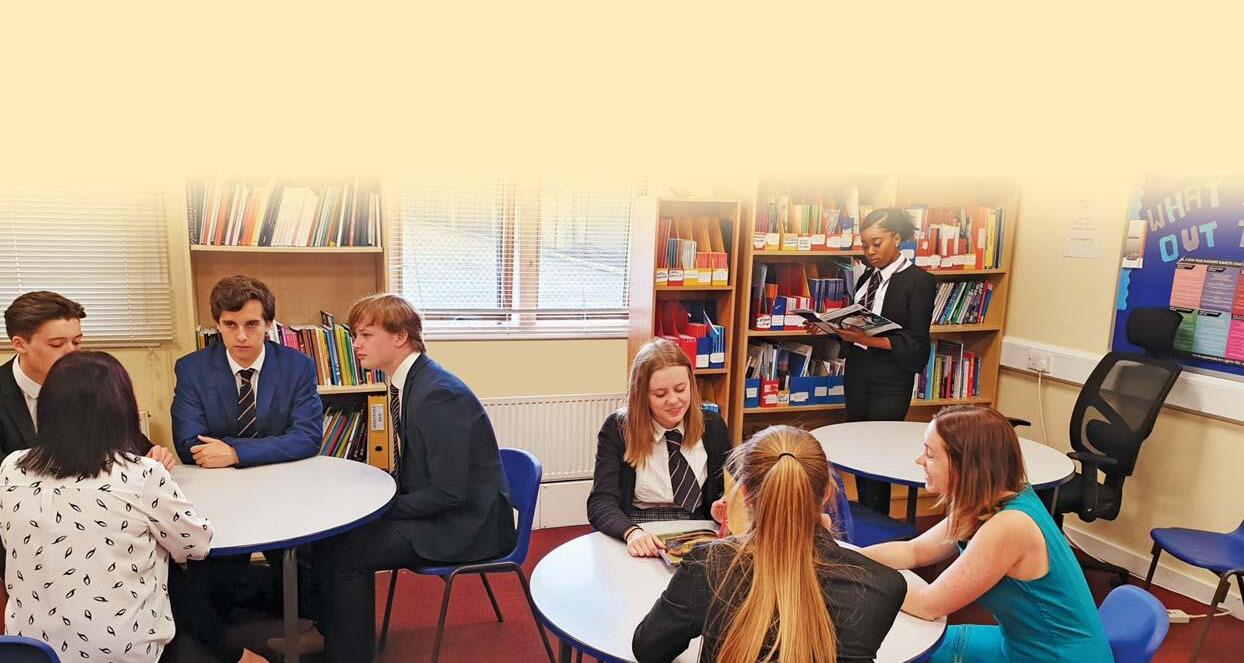
•Select subjects you enjoy. You are the person who will be studying them for two years so don't make a selection because someone else wants you to study a particular subject.
•Talk to teachers and to students at our open evening.They will obviously be passionate about their subjects, but the main thing is to get as much information as possible in order to make a sensible decision.
•Research the subjects in which you are interested. Find out about assessment and how you will be examined. If there is practical work, find out the nature of this work-group or individual, and what percentage of the final examination it constitutes. Think about whether or not subjects require coursework and think especially carefully about taking several subjects with coursework deadlines that may fall within a narrow time frame. Talking to present sixth formers will help.
•Take subjects which you are good at. This may seem obvious but this should certainly be taken into consideration. Students should be cautious that they do not take too many subjects of the same type e.g. too many practical subjects or too many new subjects. A combination will give studying more variety.
•Your future career plans- remember that some University courses have prerequisites for entry. You can look at entry requirements for courses on www.ucas.com under 'course search'. Speak with our Careers Department for more information.
•If you have no career in mind, keep your options open. The Russell Group of leading universities have provided the following website - www.russellgroup.ac.uk/ informed-choices.aspx - to help with choosing courses for students who are unsure of their future plans.

Applicants to Sixth Form are encouraged to attend our Open Evening in the Autumn Term. All applications from prospective students must be received by 31 January 2025. We will notify all applicants in the Spring Term and successful applicants will beinvited to attend a compulsory induction day in the Summer Term.
The overall entry requirement is at least 5 GCSEs including English Language and Mathematics at 5-9, usually withat least a Grade 6 at GCSE in the subjects you wish to continue into A Level.
Applicants for Biology, Chemistry or Physics must have achieved at least a Grade 6 at GCSE in both Core and Additional Science or in Triple Science. To study Physics at A Level it is highly recommended that you also take A Level Mathematics. Applicants for A Level Mathematics must have gained at least a Grade 7, and for Further Mathematics a Grade 8 at GCSE Mathematics. Applicants for other subjects must achieve a Grade 6 or above in the subject they wish to study, or similar in the case of subjects new at A Level.
All applicants must start on a minimum of three subjects in Year 12 and continue with the study of at least three A Level subjects in Year 13.
For external applicants, on receipt of the application form, a reference will be requested from the student's current school.

This reference will ask only for details of GCSE estimates and the suitability of the student for A Level study. Offers will be made where the reference supports the student's suitability to study at Davenant Sixth Form. Where estimated grades are below Davenant Sixth Form's admission requirement the student will be informed that they have not been accepted into Davenant Sixth Form.
Entry into Sixth Form is dependent on the availability of places within the subjects students wish to study.
We hope to run all subjects as advertised in the prospectus, but should numbers in a class fall below a minimum threshold, we reserve the right to withdraw the subject. We will inform all candidates who have made this choice as soon as is convenient and try to incorporate your alternative subject.

We do not have a uniform in our Sixth Form but do expect our students to wear business dress at all times. The following guidelines should be used when preparing clothes for the Sixth Form:
1. A smart suit of somber colour with a matching jacket. Jackets are to be worn at all times.
2.No hooded or vest tops are allowed.
3.Boots/trainers are not permitted.
4.Hair must be a natural shade and kept neat and tidy, with no designs shaved into the scalp. Baseball caps or similar must not be worn in school. Scarves should not be used to cover hair unless for religious purposes.
5.One pair of discreet ear-rings may be worn. There should be no other visible piercings. All students to wear their school lanyard at all times which holds their student ID and their fob for access.
•Suits including jackets to be worn with a white shirt or blouse and the Davenant tie. No midriff should be visible.
•Skirts should be no shorter than 2 inches from the knee and should not be tight fitting. Arbiter of skirt length being acceptable is always the Head of Sixth Form.
•Trousers should be tailored and not tight fitting so as to have the appearance of leggings. Cropped and capri trouser length are not allowed.
•Both skirts and trousers may be patterned e.g. hounds tooth, gingham, tartan and glen check but must not be bright colours. The jacket worn with
patterned trousers or skirt should be of one of the colours in the pattern of the skirt or trousers.
• Pinafore style dresses in somber colours and patterns are permitted and should be no shorter than 2 inchesfrom the knee, with a neckline which ensures the school tie is seen.
•Jumpers and cardigans are to be of one block colour. They should be smart, v-neck and fitted. No logos permitted. Jumpers and cardigans to be worn underneath the suit jacket. The school tie must be visible.
•Black shoes with no more than a 2 inch heel to be worn.
•Plain black or neutral tights can be worn.
• A smart suit of somber colour with a matching jacket. Jackets are to be worn at all times.
•A white shirt to be worn with the Davenant tie. Student’s shirts should be tucked in and top buttons done up.
•Black smart shoes.
•Smart, fitted, v-neck, one block colour jumper to be worn underneath the suit jacket.
Students can apply for financial assistance to support their education. The 16-19 Bursary Fund is provided by the Government for schools to distribute to students. The payments will be dependent on full attendance.
The exact amount payable varies depending on the number of students claiming the Bursary, but students whose household income is below a certain threshold will qualify. Please contact the Sixth Form Centre Manager, Mrs Ellen Buck, for further information.
Medicine/Dentistry
8/9 grades at GCSE Sciences and Mathematics.
A Level in Chemistry, Physics and Mathematics.
Veterinary Medicine
8/9 grades at GCSE in Sciences and Mathematics.
It is best to have three A Levels in subjects, such as Sciences/Mathematics.The fourth subject can be another science or a subject which can show a different skill or method of learning.
For prospective Medics and Vets there are also pre-entry tests (BMAT and UKCAT) which some institutions require to be taken.
A Levels in at least one National Curriculum subject (which is taught in primary school).
Some institutions require Maths A Level.

No specific subjects are normally required, however, it is recommended to have at least one extended writing subject at A Level, such as RS, History, Geography or English.
Physics and Mathematics are essential.
Psychology
A Science is normally required, Biology is preferable. Institutions will normally accept Psychology A Level as a science.
For vocational degrees i.e. degrees which lead to a specific career, you should undertake work experience in a relevant area.





Exam Board: AQA - Art, Craft & Design

Head of Subject: Mrs V Kennedy
Entry Requirements:
Grade 6 or higher at GCSE in Design, GCSE Graphics and or GCSE Art Textiles.
You will build on the skills and knowledge from GCSE Design studying the two areas, Graphics and Textile in greater depth. The purpose of Design is to express your thinking creatively to solve a problem. The purpose of Recording and Exploring media in different ways through Artist, Crafts People and Designers.
In Graphic Design
•Develop visual language and communication skills
•Information design, structure, hierarchy
•Signs and symbols, applying meaning
•Typography
•Variety of production techniques, both traditional and digital
In Textile Design
•Domestic textiles
•Wallpaper design
•Printed and or dyed fabric and materials
•Digital textiles
•Fashion and Costume Design
In Year 13 you will complete component01Personal investigation and component 02Externally set task. You will work on individual subject matter, which is personal to you and drivenby your ideas. You will need to investigate an aspect of contemporary or past practice of artists, photographers, designers or craftspeople in Graphics and Textiles. This will include written work of no less than 1000 and no more than 3000 words which supports the practical work.
Component 01: Personal investigation Component 02: Externally set task Where will this course lead?
This course provides you with many routes to continue Graphics or Textile design. You can apply for a Foundation Course before you progress on to a specialised degree course in the related field. You can also apply directly to degree courses, an example of this would be a buying and merchandising degree. Studying Graphics and or Textile Design can lead to careers in Textiles, Fashion, Theatre, Costume, Sportswear, Footwear, Graphics, Illustration, Publishing, Advertising, Journalism, Interiors, Marketing, Branding, Media and many more.

Exam Board: OCR



Head of Subject: Mrs V Kennedy
Entry Requirements:
Grade 6 or higher at GCSE in Art.
You are given the opportunity to develop new skills in areas which include drawing and painting, printing and 3D studies. You will be encouraged to explore a range of techniques and approaches. We believe observational drawing is a primary skill students should develop and you will learn howto record from first hand observations.
Emphasis is also placed on experimentation and development of ideas. You will learn to reflect purposefully on what you have made and understand how your work relates to thebroader world of art and design through independent research, gallery visits and group discussion.
You will learn to explore a personal starting point in your practical work and develop a critical study in an area of art that interests you.
You will be encouraged to bring highly individual approaches to your practical work, coupled with an emphasis on fine art practice.
Our teaching methods include individual and group tutorials,workshops and practical demonstrations. We encourage creativity, individuality and personal growth, with the acquisition of traditional fine art skills.
Component 01: Personal investigation (A portfolio of work and a written study).
Component 02: Externally set task.
Students wishing to continue with Art and Design apply for Foundation Courses prior toprogressing to a specialised degree course in a related field. Studying Art and Design can lead to careers in Architecture, Interior Design, Art Administration, Theatrical Design, Television and many more.



Exam Board: OCR Biology A


Head of Subject: Mrs A Johnson
Entry Requirements:
Grade 6 6 or above for GCSE Combined Science or a 6 or above in GCSE Biology. NB To study Biology at A Level it is also recommended that you have achieved at least a Grade 6 in English Language and Mathematics. It is also advised for students to choose Core Mathematics alongside their study of Biology.
Year 12 Biology allows students to develop the basic Biology skills and knowledge that provides the basis for further study.
The following topics are studied: Cell structure, biological membranes, cell division, biological molecules, nucleic acids, enzymes, exchange and transport in animals and plants, biodiversity, evolution and disease.

Year 13 Biology builds on the knowledge and understanding gained during Year 12. The following topics are studied: Communication, homeostasis, respiration, photosynthesis, genetics, evolution and ecosystems.
take?

Paper 1 - Biological Processes
2 hours 15 minutes, 37% of A Level
Paper 2 - Biological diversity 2 hours 15 minutes, 37% of A Level
Paper 3 - Unified biology 1 hour 30 minutes, 26% of A Level
The qualification also includes the opportunity to gain an endorsement in practical skills.
At the current time there are over 200 university courses which accept A Level Biology. Potential careers include, research Science, Food Technology, Biotechnology, health and clinical professions, medicine, dentistry, veterinary science, physiotherapy, pharmacy, optometry, nursing, zoology, marine biology and forensic science.


Head of Subject: Mrs L McCaughley

Entry Requirements:
There is no requirement to have studied Business at GCSE. The entry requirement for a student who has not studied GCSE Business or Economics is:
•Grade 6 or above in GCSE Mathematics and English Language

There are 2 themes that you will study:
•Business decision and strategy
•Global Business
Students will develop an understanding of Business objectives and strategies, as well as looking how businesses grow.

If you have studied GCSE Business or Economics the entry requirements are:
They will also understand the international Business market by looking at concepts around globalisation, glocalisation, the global markets and multi-national corporations.
There are 3 separate exams:
•Paper 1 = 35% of A Level
•Grade 6 or above in GCSE Business or Economics
•Additionally, students should also have achieved Grade 5 or above in GCSE Mathematics and English Language.


There are 2 themes that you will study:
•Marketing and People
•Managing Business Activities
Students will develop an understanding of the Business world and concepts, such as: supply and demand; the market; elasticity of demand; promotion; pricing strategies; motivation; recruitment and selection; entrepreneurs’ characteristics, as well as sources of finance, legislation and break even.
(2 Hrs, this is a combination of theme 1 & 4)
•Paper 2 = 35% of A Level
(2 Hrs, this is a combination of theme 2 & 3)
•Paper 3 = 30% of A Level
(This is a Pre-release Case Study examination2 Hrs, this is a combination of all themes)

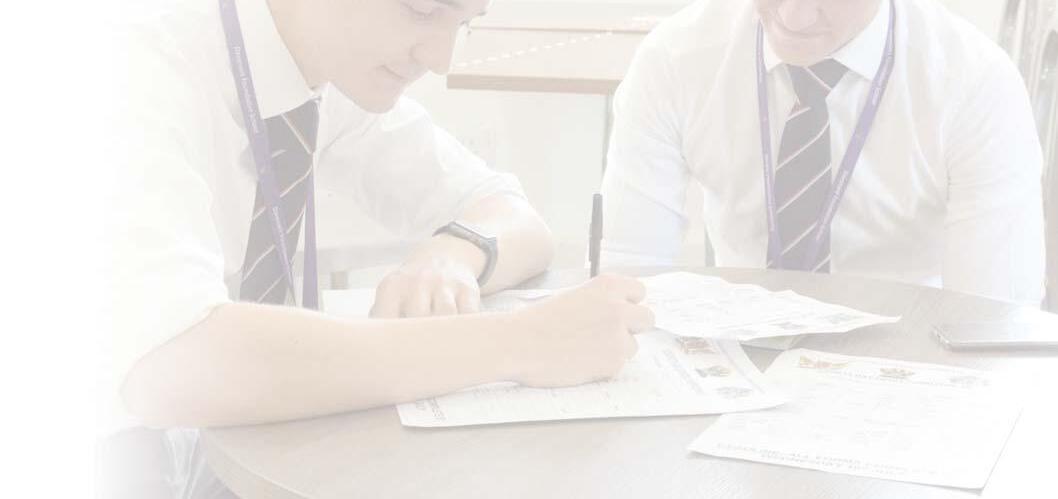
With an A level in Business you can progress on to further business management courses at college and university and you can apply for apprenticeships in a range of professions.
The A Level also equips students with knowledge and skills needed in business and prepares them for the world of work.



Paper 1, 2 hours, 35% of A Level


Exam Board: AQA 7405
Head of Subject: Mr D Liebeschuetz
Entry Requirements:
Grade 6 6 or above for GCSE Combined Science or a 6 or above in GCSE Chemistry.
Year 12 Chemistry allows students to develop the basic chemistry skills and knowledge that provides the basis for further study.
The following topics are studied: Atomic structure, Bonding, Chemical Calculations, Energetics, Kinetics, Equilibria, an introduction to Redox Chemistry, Periodicity, Group 2, Group 7, Alkanes, Halogenoalkanes Alkenes and Alcohols.
Year 13 Chemistry builds on the knowledge and understanding gained during Year 12.
The following topics are studied: Thermodynamics, Rate Equations, further study of Equilibria and Redox Chemistry, Acid Base Equilibria, Period 3, Transition Metal Chemistry, Isomerism, Aldehydes, Carbonyl Compounds, Carboxylic Acids, Aromatic Chemistry, Amines, Polymers, Amino Acids and DNA, Organic Synthesis and NMR Spectroscopy.
• Relevant physical chemistry topics
• Inorganic chemistry
• Relevant practical skills
Paper 2, 2 hours, 35% of A Level
• Relevant physical chemistry topics
• Organic chemistry
• Relevant practical skills
Paper 3, 2 hours, 30% of A Level
• Any content
• Any practical skills
The qualification also includes the opportunity to gain an endorsement in practical skills.
At the current time there are over 200 university courses which accept A Level Chemistry. Grade A in A Level Chemistry is usually mandatory for the study of medicine or veterinary science. Other potential careers include Dentistry, Pharmacy, Forensics, Research Science, Business, Law, Engineering, Food Technology and Biotechnology.

Exam Board: OCR


Head of Subject: Mrs T Theron
Entry Requirements:
GCSE Grade 6 or above in Computer Science.

Computers are widely used in all aspects of business, industry, government, education, leisure and the home.Computer Science is relevant to the modern and changing world of computing. This A Level has a focus on programming and the importance of computational thinking as a discipline. You will also learn the fundamental principles of how computer systems work.
You will study computer systems in depth. This includes characteristics of contemporary processors, input/ output and storage devices, software development, exchange of data, web technologies, databases, data types, data structures and algorithms.
You will also develop programming skills and the ability to write algorithms.
This includes elements of computational thinking, problem solving and programming, developing algorithms.
You will develop a deeper understanding of the fundamentals of computer science, building on the theory studied in Year 12. Topics are studied at a more advanced level.
You will also carry out a practical project tasks where you design, build, test and evaluate a solution of your choice.
Unit 01 - Computer Systems (40% of A Level)
Unit 02 - Algorithms and Programming (40% of A Level)
Unit 03 - Programming Project (20% of A Level)
A Level Computer Science is valued by universities and employers since it requires the development of analytical thinking and problem-solving skills.This course also lays an appropriate foundation for further study of Computer Science, Engineering, Physics or related subjects in higher education.
This course opens doors to high-growth sectors such as cybersecurity, data science, and machine learning. and the skills you’ll learn make you well-suited for roles in finance, healthcare, entertainment, and beyond. With the potential to shape the future of technology, studying computer science puts you in the middle of an everexpanding field, ensuring exciting future career growth.


Exam Board: Edexcel

• or a monologue duologue performance realisation from one key extract from a performance text.
• Centre choice of performance text

Head of Subject: Mrs S Brooks

Entry Requirements:
Grade 6 or above GCSE Drama and /or Grade 6 in GCSE English Language.
Component 3: Theatre Makers in Practice
Written examination: 2 hours 30 minutes
40% of the qualification

Interpretation of plays for performance; Theatre Practitioners; Live Productions seen; Practical and Theoretical Study of Drama and Theatre.
Component 1: Devising
Coursework 40% of the qualification
Content overview
• Devise an original performance piece.
• Use one key extract from a performance text and a theatre practitioner as stimuli.
• Centre choice of text and practitioner.
• Performer or designer routes available.
Component 2: Text in Performance
Coursework 20% of the qualification
Content overview
• A group performance of one key extract from a performance text.
80 marks

Content overview
• Live theatre evaluation – choice of performance.
• Practical exploration and study of a complete performance text – focusing on how this can be realised for performance.
• Practical exploration and interpretation of another complete performance text, in light of a chosen theatre practitioner – focusing on how this text could be reimagined for a contemporary audience.
•Centre choice of 15 performance texts.
•Choice of 8 practitioners.
This course is ideal for anyone wishing to study Drama at university or who wish to pursue a career in the media or Performing Arts. As the subject demands practical, creative and communication skills in almost equal measure, it could lead to careers in any of the following areas: Acting; Teaching; Communications and Human Resources; Recruiting; Marketing; Advertising, and in any other career which involves contact with the public or making presentations.




Exam Board: Edexcel 9EC0
Head of Subject: Mrs T Theron
Entry Requirements:
Grade 6 or above in GCSE Mathematics and English Language; Grade 6 or above in Business Studies or Economics GCSE if taken, however there is no requirement to have studied either at GCSE.
In the first year you will be introduced to both micro and macro economics: Theme 1:Introduction to markets & market failure.
Theme 2: The UK economy-performance and policies.
In the second year the students also study: Theme 3: Business behaviour and the labour market.
Theme 4: A global perspective.
Paper 1: Markets and business behaviourworth 35% of the A Level
Paper 2: The national and global economyworth 35% of the A Level
Paper 3: Microeconomics and Macroeconomicsworth 30% of the A Level
Studying Economics is excellent preparationfor a degree in Economics or a related subject. Students hoping to go on to a degree in Economics are strongly advised to take Mathematics A Level.
Studying Economics is often a preferable route for those looking for careers in banking and the financial sector; however the subject is extremely versatile and the many career opportunities are varied.
Economists are often suited to roles within industry, research, as well as public sector roles due to the analytical skills that the course emphasises.

(NB. This course cannot be studied with English Literature).


Exam Board: AQA English Language and Literature
Works of literature and non-fiction extracts are examined with a view to developing your critical and creative skills in writing, You will learn to make connections between texts and gain confidence in your use of literary and linguistic terminology.


Head of Subject: Miss G Jones
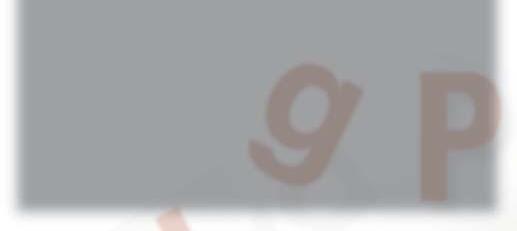
Entry Requirements:
Minimum of Grade 6 or above in both English Language and English Literature.
The course draws on the academic field of stylistics, where you will study a range of literary texts and non-literary extracts which have been produced by a variety of writers working in different centuries.
The focus of study is on the significance of place, point of view, and genre in prose texts; the forms and functions of poetic voice; the individual in society, and conflict in drama.
You will learn how to creatively recast texts into different genres, and on developing your research and writing skills.
Telling stories in prose fiction(novel), poetry, and a range of literary and nonliterary extracts.

Exploring Conflict: a re-creative response to prose fiction (novel) and associated commentary.
Conflict in Drama: an exploration of conflictin a drama text.
A personal investigation into a specific technique or theme in literary and nonliterary discourse for non-exam assessment (assessed by teachers, moderated by AQA).
An English A Level will provide you with a variety of skills that are essential for further study and a range of professional careers such as journalism, law, teaching, media, business, politics, diplomacy, and many others.
(NB. This course cannot be studied with English Language and Literature).


Literary Genres: tragedy. An exploration of tragedy in three texts: poetry, Shakespeare, and one other drama text.


Exam Board: AQA English Literature B
Head of Subject: Miss G Jones
Entry Requirements:
Grade 6 or above in English Language and Literature at GCSE.
At A Level you will study a minimum of 8 substantial literary texts spread across the 2 years. Two from each of the genres of poetry, prose and drama; three pre-1900 texts including one Shakespeare play and one text first written or performed post2000. You will also learn how to respond to unseen texts.
Works of prose, poetry and drama are examined with a view to developing critical skills and an understanding of context.
You will learn to make connections across texts and gain confidence in your use of literary, linguistic, and critical concepts.
Elements of Political Writing: An exploration of political and social protest writing in poetry and two prose texts.
Theory & Independence: two essays, each responding to a different text and different aspects of an anthology of critical material for non-exam assessment (assessed by teachers, moderated by AQA).
An English A Level will provide you with a variety of skills that are essential for further study and a range of professional careers such as journalism, law, teaching, media, business, politics, diplomacy, and many others.

Exam Board: AQA



Head of Subject: Mrs S Yates

Entry Requirements:
Grade 6 or higher at GCSE French.
Students examine issues within two main topics: Current trends and Artistic culture in the French-speaking world. Students will develop their abilities to communicate in written and spoken French and deepen their understanding of the cultures of the countries where French is spoken.
Unit 1: Listening, Reading and Writing
Unit 2: Writing
Unit 3: Speaking
Year 13 topics include Multicultural Society, Social Issues, Politics and Immigration. Students research and debate topics and also study a book, No et Moi by Delphine de Vigan and a film, La Haine, directed by Mathieu Kassovitz.
We encourage students to read and listen to as much French as possible and they also have weekly sessions with the Language Assistant.
Where will this course lead?
Of all subjects, languages lend themselves most readily to combination with other disciplines. Job prospects are excellent for language graduates. Applicants with knowledge of languages are much sought after by companies operating in global markets, especially travel and tourism, sales and marketing, commerce, finance, industry and the media.


Exam Board: Edexcel



Head of Subject: Mr O Virciglio
Entry Requirements:
Grade 8 or higher at GCSE Mathematics.
Topic areas studied within Pure Mathematics include complex numbers, which allow the solution of a range of equations that would otherwise have no solutions, through the introduction of ‘imaginary’ numbers, and matrices which consist of grids of numbers that can be used to represent transformations and are used to solve simultaneous equations amongst many other uses.
Other areas of Pure Mathematics are also covered such as polar co-ordinates, differential equations and hyperbolic functions. Each of these builds on earlier topics and encourages the development of a wider understanding of the ways in which mathematical topics are interconnected.
In Mechanics students will learn basic principles of forces and their moments, work and energy, impulse and momentum and centres of mass are used to model various situations, including: rigid bodies in equilibrium; particles moving under gravity, on a surface, in a circle, attached to springs; bodies colliding with direct or oblique impact.
If you are thinking about studying Mathematics, engineering or physics at university, you are advised to take Further Mathematics at A Level.
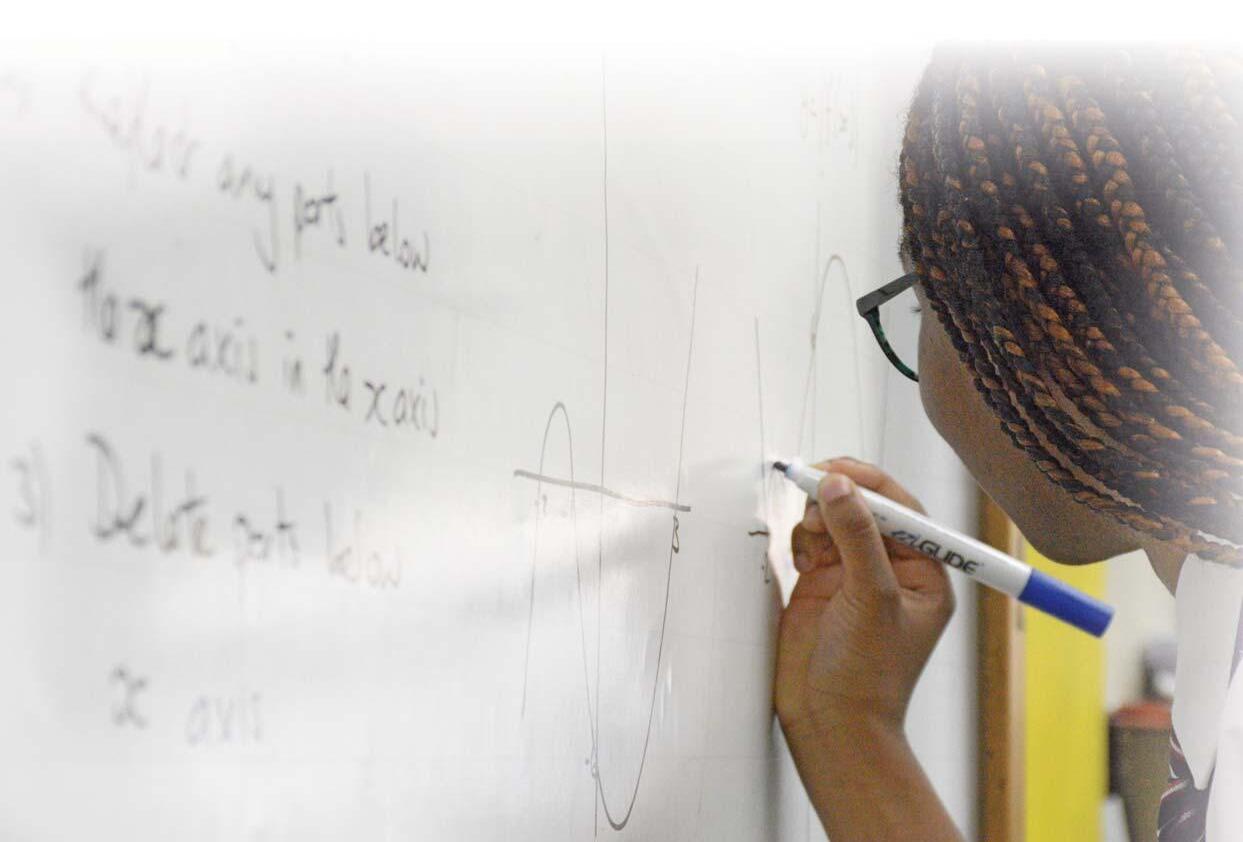
It will assist your study in any of the sciencesubjects and is essential if you are consideringa career in physics or engineering.
Some universities give lower offers for Mathematics based degrees if Further Mathematics A Level is included.

Exam Board: Edexcel


Paper 3
This will be assessed by a written examination of 2 hours 15 minutes and will count for 20% of the A Level.

Head of Subject: Mr S Morton
Entry Requirements:
Grade 6 or above in GCSE Geography.
Grade 6 in Mathematics and English Language is also advised.

Curriculum content
Paper 1
This will be assessed by a written examination of 2 hours 15 minutes and will count for 30% of the A Level.
Topics covered are:
• Tectonic Processes and Hazards
• Coastal Landscapes and Change
• The Water Cycle and Water Insecurity
• The Carbon Cycle and Energy Security
Paper 2
This will be assessed by a written examination of 2 hours 15 minutes and will count for 30% of the A Level.
Topics covered are:
• Globalisation
• Regenerating Places
• Superpowers
• Migration, Identity and Sovereignty
This will take the form of a synoptic investigation of a geographical issue and will draw upon knowledge and understanding of the content from Paper 1 & Paper 2.
NEA Independent Investigation
Additionally, students will complete an Independent Investigation, which will account for 20% of the qualification.
Where will this course lead?
In geography we develop a wide range of skills which therefore provides an equally wide range of career options. For example, geographers can work in the environment field, but also can have varied careers in industries such law, property, tourism, development, and urban planning.



Exam Board: Edexcel
from the following: anarchism, ecologism, feminism, multiculturalism, feminism)


Head of Subject: Mrs G Mears-Higgs
Entry Requirements:
2 Grades 6 or higher in English and 6 or higher in a Humanities subject (History, Geography or RE).


You will study how politics should work in the UK and what actually happens in practice. You will also scrutinise the relationship between government and people as well as major political institutions in the UK. You will start to examine how the systems in the UK compare with those in the USA.
Underpinning all study of politics will be in-depth reviews of current news stories in order to assess the advantages and disadvantages of our political system.
There is no courseworkin Government and Politics and all modules are equally weighted.
Component 1: UK Politics (democracy and participation, political parties, electoral systems, voting behaviour and the media, conservatism, liberalism, socialism)
Component 2: UK Government (the constitution, parliament, Prime Minister, executive, relationships between the branches and one idea
In Year 13, you will study the American political system. You will look at the representative processes of the US political system in order to assess the advantages and disadvantages of these processes. You will also examine the institutional framework of US government and consider the interrelationships between Congress, President and Supreme Court and the health of US federalism. Finally you will compare and contrast the political systems in the UK and USA. As in Year 12, in-depth reviews of recent, relevant news stories will support all areas of study.
Component 3: Comparative Politics (the US Constitution and federalism, US Congress, US presidency, US Supreme Court and civil rights, democracy and participation, comparative theories.)
The skills developed on this course are valuable and transferable to all progression routes. There is a strong emphasis on supporting students to enhance their communication, research, analytical and critical thinking skills. These are impressive to universities and employers alike.
Government and Politics is an academic A-level; widely respected by employers and universities. The course gives students an understanding of the contemporary world and so is relevant to careers in journalism, law, economics, international relations, the Civil Service or local or European government.


Exam Board: OCR


Head of Subject: Mrs D Perry

Entry Requirements:
Grade 6 or higher in GCSE History.
Students will study mid-Tudor crises focusing on religious change, rebellion and unrest under Edward VI and Mary I. They will also examine Elizabethan England including Elizabeth I’s management of social and economic affairs. This unit carries a weighting of 25% of the total A Level and is assessed through external examination.
This unit carries a weighting of 25% of the total A Level and is assessed through external examination. Students will also study the unification of Italy including the revolutions which paved the way for unification as well asthe role of fascinating individuals such as Garibaldi, Mazzini and Cavour. This unit carries a weighting of 15% of the total A Level and is also assessed through external examination.
Unit 1: Y107 England 1547-1603: the Later Tudors.
Unit 2: Y215 Italy and Unification 1789-1896.
Students will undertake a personal investigation on a topic of their choice. They will identify an area of historical debate within this topic and read a wide range of books and articles. Their work will culminate in a 3,000-4,000 word essay. This unit carries a weighting of 20% of the total A Level. The final module studied will focus on the struggle for American Civil Rights from 1895-1992. This unit will examine the development of civil rights for Women, Native Americans, Workers and African Americans by investigating key events and individuals as well as evaluating historian’s interpretations of this period. This unit carries a weighting of 40% of the total A Level and is assessed through external examination.
Unit 3: Y319 Civil Rights in the USA 1865-1992.
Unit 4: Y100 Topic based essay.
History as a rigorously academic subject is highly valued by a range of employers. Many of the skills developed through the study of History are particularly useful for those wanting to study law, politics and economics at university.


Exam Board: Edexcel



Head of Subject: Mr O Virciglio
Entry Requirements:
Grade 7 or higher at GCSE Mathematics.
The course develops your algebraic skills from GCSE such as solving quadratic equations and transforming graphs including circles.You will be introduced to calculus techniques for finding the gradient and areas under curves.
You will also learn how to use logarithms to solve equations, how to sum arithmetic and geometric series, further manipulation of algebra, functions, graphs, more advanced techniques of differentiation and integration, numerical methods to solve equations, simple differential equations and vectors.
The statistic element of the course builds on work from GCSE and also introduces more robust techniques for examining correlation and making predictions using regression lines.
You will use the binomial distribution to model real life problems.
The mechanics component of the course focuses on the motion of particles resolving forces and applying Newton’s laws of motion.
Mathematics may be studied for its own sake out of general interest or as part of a career in mathematics or statistics or as a support to your other A Level subjects.
It will assist your study in any of the science subjects and is essential if you are considering a career in physics or engineering.
A Level Mathematics is an excellent basis for a wide range of university courses and careers as the skills it develops are in high demand by employers and universities.
In addition to developing the ability to solve problems and think logically, the study of Mathematics provides opportunities to develop team-working skills, resilience, effective communication of complex ideas and the ability to use your own initiative.
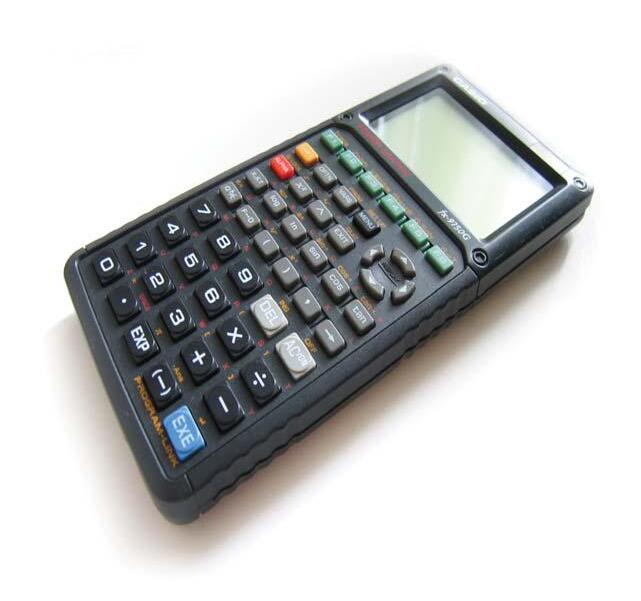
Mathematics will assist your study in any of the science subjects and is essential if you are considering a career in physics or engineering. Economics, Psychology, Business, Computing and Geography all benefit from students having fluent and confident mathematical skills.

Exam Board: AQA



Head of Subject: Mrs N Kingsbury
Entry Requirements:
Grade 5 in English Language and Literature.
NB. It would also be advantageous in your study of A Level Media for you to also have a Grade 6 or above in a creative subject e.g iMedia, Art or Graphic Design.
Media is an exciting and dynamic subject. It has become ever more important for you to be able to understand the messages that surround you in your media-saturated worldand by studying this subject you will gain the tools to not only analyse and critically evaluate media texts, but to also create them.
In the first year you will learn the foundations of media study including media language, representation, industries and audiences.
In Year 13 you will build upon your knowledge gained in Year 12 in audio-visual, online and print forms of media and move onto creating your own media products. At the end of the course you will be examined in the following way;
Paper 1 – Application of the framework: Media Language, Representations, Audience and Industry
Paper 2 – In depth Analysis of Media Products and Debates.
Non-examined Assessment – Creating a Media Product.

Courses in Media Studies could lead you to degrees in film and media, and careers injournalism, broadcasting, public relations, advertising and marketing to name just a few.

Exam Board: Edexcel

Head of Music: Mrs R Tubb
Entry Requirements:
Grade 6 or above at GCSE Music. It is not a requirement but potential Music
complete a 4-part harmony and counterpoint exercise in the style of J.S. Bach.


A Level students are advised that a Grade 5 or above on your chosen instrument and/ or a Grade 5 ABRSM Music Theory would be particularly advantageous for this level of study.
You will engage critically with a wide range ofmusic and musical contexts, ranging from Baroque chamber music, opera, film music, jazz and pop as well as Indian and Electronic genres. You will learn how to analyse the music in detail as well as reflect on the circumstances in which it was composed.
Component 1: Performing (internally assessed, externally moderated).

The course is laid out to continue in the development of your skills from GCSE in Performance, Composition and Analysis.
You will be expected to produce a recital performance of at least 8 minutes on one or more instruments of at least Grade 7 standard.
You will compose a free composition over the two years, as well as developing your harmony and theory knowledge in order to
Component 2: Composing (externally assessed).
Component 3: Appraising (externally assessed).
With the Edexcel Music A Level qualification, students can continue with their studies at University or a Conservatoire.You will learn vital skills for pursuing a career anywhere in the music industry, ranging from artist and event management to performing and producing.


Exam Board: OCR

Head of Faculty: Miss C Ball
Entry Requirement:
4.Practical performance in physical education (NEA)

We recommend that students have at least a 6 grade GCSE PE, and obtained two 6 grades in Combined Science GCSE or a 6 in GCSE Biology. The ability to perform to a good standard in one activity, while not a prerequisite for the course, is highly recommended ifstudents are aiming for 9-5 A Level grades.

•Performance or coaching in an approved activity
•The evaluation and analysis of performance for improvement (EAPI)
1. Physiological factors affecting performance:

You will learn and investigate physiological factors affecting performance; Psychological and Socio-cultural themes in Physical Education.The theoretical units will provide you with a knowledge base that will support your practical performance and allow you to access higher marks in the coursework unit.
1. Physiological factors affecting performance:
•Applied anatomy and physiology
•Exercise physiology
•Biomechanics, including technology in sport
2.Psychological factors affecting performance:
•Skill acquisition
•Sports psychology
3.Social-cultural issues in sport
•Sport and society
•Global sporting events
•Applied anatomy and physiology
•Energy for exercise
•Recovery, altitude and heat
•Injury prevention and rehabilitation
•Biomechanics
2. Psychological factors affecting performance:
• Skill acquisition
• Sports psychology
3.Social-cultural issues in sport

• Ethics and deviance in sport
• Commercialisation and technology in sport
4.Practical performance in physical education (NEA)
• Performance or coaching in an approved activity
• The evaluation and analysis of performance for improvement (EAPI)
Completing an A Level in Physical Education can enable students to progress to related degree courses in Sports Science, Exercise Science, Sports Coaching, Sports Studies, Leisure Studies, Sports Development, Recreation Management, Sports Events Manager, Nursing, Physiotherapy, Teaching, and career paths such as Police and Armed Forces.





Exam Board: OCR H556
Head of Subject: Ms C Parker
Entry Requirement:
Grade 6 6 or above for GCSE Combined Science or a 6 or above in GCSE Physics plus a 7 for GCSE Maths.
NB: To study Physics at A Level, it is highly recommended that you should also study Mathematics at A Level as 40% of the Physics A Level exams will be of level 3 (A Level standard) Mathematics.For most Physical Science and engineering degree courses both A Level Physics and Mathematics are required.
Year 12 Physics allows students to develop the foundation Physics skills and knowledge that provides the basis for further study.
The following topics are studied: Forces and Motion, Materials, Electricity, Waves and Quantum Physics.
Year 13 Physics builds on the knowledge and understanding gained during Year 12. The following topics are studied: Thermal physics, Circular motion, Oscillations, Gravitational fields, Astrophysics and Cosmology, Capacitors, Electric fields, Electromagnetism, Nuclear and particle physics and Medical imaging.
Paper 1, Modelling Physics 2 hours 15 min, 37% of A Level.
Includes Practical skills, Forces and motion Newtonian world and astrophysics.
Paper 2 Exploring Physics 2 hours 15 min 37% of A Level.
Includes Practical skills, Electrons, waves and photons, Particles and medical physics.
Paper 3, Unified Physics 1 hour 30 min, 26% of A Level.
• Any content • Any practical skills.
The qualification also includes the opportunity to gain an endorsement in practical skills.
A Level Physics is a well- respected course because Physicists are problem solvers.
The analytical skills you develop make Physicists versatile and adaptable so they work in many careers. A Level Physics is essential for a career in engineering and can be advantageous for a career in medicine.
An A Level in Physics will demonstrate that you have acquired a wide variety of skills from practical work, using and adapting models in explaining the world around us and thinking skills and will be a good basis for a path into many degree courses.
The following document from the Institute of Physics gives further information. https://collingwoodcareers.files.wordpress.com/ 2018/07/iop-physics-at-a-level.pdf




Exam Board: AQA Three-Dimensional Design
Head of Subject: Mrs V Kennedy
Entry Requirements:
Grade 6 GCSE 3D Product Design or GCSE Product Design
In Year 12 you will build on the skills and knowledge from GCSE 3D Product Design or GCSE Product Design course exploring media, processes and techniques in both traditional and new media working in greater depth. You will have to respond to a concept, work on a brief or theme, working through each stage of the design process, in order to make a fully working prototype showing your appreciation of the relationship of form and function. You will select a client and work closely with their requirements in order to develop and refine a suitable product for them. This will include the use of CAD/CAM where possible.
Areas of study might include:
•exhibition design
•design for theatre, television and film
•interior design
•product design
•environmental and architectural design
•3D digital design
Component 01: Personal investigation (60%)
Component 02: Externally set task (40%)
In Year 13 you will complete component 01 and component 02. For the Personal investigation you will work on individual subject matter, which is personal to you and driven by your ideas. You will need to investigate an aspect of contemporary or past practice of artists, photographers, designers or craftspeople. This will include written work of no less than 1000 and no more than 3000 words which supports the practical work. The externally set task follows a similar format of preparatory work of research and design development and a 15 hour exam where you will produce an outcome.
We live in a world that is forever changing and growing that requires young designers to come up with new and innovative concepts to solve problems. 3D Product Design is an excellent qualification to lead you into a range of careers including Architecture, Jewellery design, Product design, Materials engineering, Furniture design, Set design and many other design related fields.





Exam Board: AQA Psychology

Head of Subject: Ms N Begum
Entry Requirements:
Grade 6 in English Literature and Language and Grade 6/6 in Combined Science or a Grade 6 in GCSE Biology.
These skills will assist you in making informed judgments, writing essays and analysing psychological reports – all skills which are particularly relevant to young people and are transferable to further study and the workplace.

Paper 1: Introductory Topics in Psychology
• Social Influence
• Memory
• Attachment
• Psychopathology
Paper 2: Psychology in Context
• Approaches in Psychology
• Research Methods
• Biopsychology
Paper 3: Issues and Options in Psychology
• Schizophrenia
• Forensic Psychology
• Gender
• Issues and Debates in Psychology
The syllabus content will develop a range of valuable skills, including critical analysis, independent thinking and research. It will also develop mathematical knowledge and research skills.
This engaging and stimulating introduction to Psychology could lead to careers in management training, accountancy, teaching, sport, nursing, social work, the police and the armed forces. However, every employer looks for general and transferable skills, and Psychology offers the academic integrity and skills that Higher Education and employers value.


Exam Board: OCR


Head of Subject: Mr A Midgley
Entry Requirements:
6/6 in English Language & Literature or 5/6 in English Language & Literature with a 6 in a Humanities subject. This course provides a thought provoking programme of study where students will have the opportunity to engage in ethical debates, study the ancient origins of Western philosophy and examine the founding claims and documents of Christianity, as well as its changing face in the modern world.
Unit 1: Philosophy of Religion.

In year 12, our Philosophy units survey ancient Greek Philosophy; arguments for and against the existence of God; the problem of evil, and challenges to religious belief.
The Ethics module looks at contemporary moral issues such as euthanasia, war, medical research and business ethics and ethical theories including Utilitarianism and Natural Law that might help navigate these moral debates.
The Developments in Christian Thought module examines the origins and growth of Christian theology from Augustine onwards; as well as death and the afterlife; and the Person of Jesus of Nazareth.
Unit 2: Religious Ethics and contemporary issue.
Unit 3: Development in Religious Thought.
We start with a more in depth philosophical study about what God is like within theistic traditions and what language we use to talk about God, looking at medieval and modern perspectives. In Ethics, we look at the idea of the conscience, meta-ethics, and attitudes to sex and sexuality. Finally, we look at the challenges presented to Christianity by secularism, Marxism and gender theories, and the response to these challenges through Liberation Theology and feminist theology.
Religious Studies is rated as a top-tier facilitating subject by Russell Group universities. It teaches synthesis, research, and evaluative skills, and tools for creative thought.
It provides excellent preparation for any Arts-based degree, being particularly useful for students reading Law, Politics, Philosophy, History, Classics, Theology, Journalism and many more; and the focus on modern ethical issues makes it an admirable fourth A Level for prospective medics.


Exam Board: AQA


Head of Subject: Miss N Price

Entry Requirements:
Any combination of 6/5/5 in English Literature, English Language and one Humanities subject. Or: 6/6 in English Language, English Literature, if no Humanities subject taken.
plays in the 21st century western world and around the globe. Students will also explore the relationship between ownership, control and globalisation.

Students will examine types of family households, the changing concept of childhood, and how the family functions. Study also includes the changing demographic makeup of the UK combined with government policies with regards to areas such as welfare and marriage. Changes in the education system, will also be explored, taking a critical perspective on the differential achievements of different social groups (gender/ethnicity).
In addition to this, students will look at the effect of educational policies on the impact of and experience and access to education including research methods.
Unit 1: Families and Households.
Unit 2: Education with Research Methods.
Students will learn about the role the Media
On top of this, they will analyse how the media represents different social groups (age, gender, ethnicity) and the impact this has on prejudices and discrimination. The second topic students will learn about is Crime and Deviance. They will look at the nature of deviant behaviour and how it should be dealt with. They will learn to evaluate the different theoretical approaches to understanding why crime and deviance exists, tackling crime and the use and accuracy of recording crime. Finally, students will gain further depth in how sociological theories aim to explain society, as well as debate whether society can be examined in the same way as the natural sciences.
Unit 3: Media.
Unit 4: Crime and Deviance with Sociology Methods. Sociological Theory.
Sociology students are found in a multitude of occupations including Social Services, Civil Services, Criminal Justice,Teaching, Government and Counselling. Its multidisciplinary nature provides transferable skills. Sociological skills include the ability to judge and evaluate evidence and understand complex situations. An excellent subject for professional careers.


Exam Board: AQA


Head of Subject: Mrs S Yates

Entry Requirements:
Grade 6 or higher at GCSE Spanish.
Students examine issues within two main topics: Current Trends and Artistic Culture in the Spanish-speaking world.
Students will develop their abilities to communicate in written and spoken Spanish and deepen their understanding of the cultures of the countries where Spanish is spoken.
Year13 topics include Multicultural Society, Social Issues, Politics and Immigration.
Students research and debate topics and also study two books, Las Bicicletas son para el verano by Fernando Fernán Gómez and La casa de Bernarda Alba by Federico García Lorca, as well as the film El Laberinto del Fauno by Guillermo del Toro.
We encourage students to read and listen to as much Spanish as possible and they also have weekly sessions with the Language Assistant.
Which modules will you take?
Unit 1: Listening, Reading and Writing
Unit 2: Writing
Unit 3: Speaking
Of all subjects, languages lend themselves most readily to combination with other disciplines. Job prospects are excellent for language graduates. Applicants with knowledge of languages are much sought after by companies operating in global markets, especially travel and tourism, sales and marketing, commerce, finance, industry and the media.


Exam Board: Edexcel


Head of Subject: Mr B Taylor
Entry Requirements:
Successful applicants will gain a majority of A grades for Attitude for Learning in the first term at Sixth Form and have the confidence of teaching staff that their attainment will not drop below their target grades during the year. A letter of application will also be required.



The Extended Project Qualification (EPQ) is a course running between NovemberNovember, and operating outside of a student’s normal A Level curriculum.
Entry onto the course is contingent upon a very successful progress check in the autumn term of Year 12, and a successful letter of application.
Those who qualify will write a 5,000 word dissertation or investigation/field study; or produce a performance (musical or dramatic) plus a 1,000 word essay rationale; or an artefact (using resistant materials, textiles or others) plus a 1,000 word essay rationale
Support is provided by whole cohort seminars from the start of January, and individually supervised tutorials with a dedicated member of staff.
The main project is assessed in its own right, along with skills applied through the process, for example presentation, referencing, research, planning, and self-reflection.
The final EPQ comprises the central project, a bibliography and activity log (representing the student’s academic journey), and a record of presentation.
Students gain an AS qualification.
In addition, the EPQ allows students to develop a useful range of extra study skills that are useful preparation for the demands of university work. The EPQ is an opportunity for students to choose their own, specific, area of study - anything from time travel to terraforming, Tudor history, or treatments for diabetes. The topic can be anything the student wants.

Core title: Pearson Edexcel Level 3
Certificate in Mathematics in Context.

Exam Board: Edexcel

Head of Subject: Mr S Yildirim
This course can help in careers and the study of Economics, Sociology, Psychology, Geography, Biology, and Business.



Entry Requirements:
Grade 5 or higher in both GCSE Mathematics (Higher Tier) and English Language or Literature.

13?
Core Mathematics is a relatively new AS Level qualification that has been designed to encourage more students to study Mathematics at a post-16 level.
The course centres on the application of mathematical skills and techniques in the following areas;
Statistics, Linear Programming, Probability and Sequences, with the theme of each lesson being to apply these techniques in solving real life situations.
Concepts will be taught alongside situations so that it can be seen how they correlate to other disciplines and in the work place.
The skills gained from this course will greatly benefit those students studying subjects such as Biology, Geography, Business, Psychology and Economics, but do not want to embark on a full Mathematics A Level.





Our student careers aims are:
1. Self development – to be able to showcase their employability skills
2. Careers exploration – to understand post-18 options, careers aspirations and career progression choices
3. Careers management – to be able to research and put into practice career choices independently
This is achieved through the following programme:
Learning from career and labour market information
•Using Unifrog to explore interests and inform post-18 choices
•Access to a well-stocked Careers Library
•Regular updates on careers information
Addressing the needs of each pupil
•UCAS guidance meetings and bespoke student feedback
•Tutorial programme to support students into post-18 learning
•Software for planning and tracking employability skills and post-18 options
Linking curriculum to careers
•A careers enrichment programme covering a wide variety of post-18 options
•Post-18 options evening for parents and students
Encounters with employers and employees
• Mock interview training and CV guidance
•Careers talks by employers from a wide variety of sectors
•Careers fair
•Careers assembly
Experiences of workplaces
•Work experience training and placement
Encounters with further and higher education
•University encounters including attendance at a UCAS careers fair
•Access to universities, apprenticeship and gap year providers
Personal guidance
• Group sessions with a qualified careers advisor plus careers staff and tutors for careers support
This programme is linked with the school’s pastoral system to ensure students make fully informed choices about their future.
Currently 80% of students go onto University, with over 40% to Russell Group universities. Many others do apprenticeships or further learning.
University Of Aberdeen
Aberystwyth University
Aberystwyth University
Anglia Ruskin University
Anglia Ruskin University
Anglia Ruskin University
Anglia Ruskin University
Anglia Ruskin University
Bangor University
University of Bath
University of Bath
University of Bath
.Theology
.Marine and Freshwater Biology
.Cultural Heritage Studies
.Biomedical Science
.Medicine
.Business with Events Management (with Placement Year)
.Accounting and Finance
.Banking and Finance (with Placement Year)
.Zoology with Herpetology
.Psychology
.Computer Science
.Mathematics with professional placement or study abroad
Birkbeck, University of London .Biomedicine with Advanced Pathways
Birmingham City University
Birmingham City University
Birmingham City University
University of Birmingham
University of Birmingham
University of Birmingham
University of Birmingham
University of Birmingham
.Economics
.Architecture
.Accounting and Finance
.Social Anthropology and History
.Computer Science with Digital Technology Partnership (PwC)
.Biomedical Science
.Psychology
.Psychology
Bloomsbury Institute London . .Law and Legal Practice
Bournemouth University . . . .
Bournemouth University
University of Bristol
Bristol, University of the West of England
University of Cambridge
Cardiff University
City, University of London
City, University of London
City, University of London
Coventry University
Coventry University
Durham University
Durham University
.Computer Animation & Visual Effects
.Marketing Communications with Advertising
.History
.Philosophy
.Geography
.Medicine
.Accounting and Finance
.Mathematics and Finance (with Integrated Foundation Year)
.Journalism
.Financial Economics
.Business Economics
.English Literature and History
.Chemistry (International)
University of East Anglia UEA .Pharmacology and Drug Discovery with Foundation Year
University of East Anglia UEA
. Pharmacology and Drug Discovery with Foundation Year
University of East Anglia UEA . . Economics with a Placement Year
University of East Anglia UEA . . Pharmacy with a Preparatory Year
University of East London
University of Essex
.Biochemistry and Biotechnology
.Finance (Including Placement Year)
University of Exeter
University of Exeter
University of Exeter
University of Exeter
University of Glasgow
University of Greenwich
University of Greenwich
University of Greenwich
University of Greenwich
University of Greenwich
University of Greenwich
University of Greenwich
University of Hertfordshire
Imperial College London
University of Kent
University of Kent
University of Kent
University of Kent
University of Kent
Keele University
Keele University
Keele University
King's College London, University of London
King's College London, University of London
King's College London, University of London
Kingston University
Kingston University
Kingston University
Kingston University
Lancaster University
University of Leeds
University of Leeds
University of Leeds
University of Leeds
University of Leeds
University of Leeds
University of Leeds
University of Leicester
University of Leicester
University of Liverpool
University of the Arts London
.Computer Science
.English and Communications
.Politics and International Relations
.Mathematics and Data Science
.Philosophy/Russian
.Film & Television Production
.English Literature
.Business Management
.Law
.Criminology and Criminal Justice
.Law with Criminology
.Business with Finance
.Sports Therapy
.Chemical Engineering
.International Business with a Year Abroad
.Law
.Electronic and Computer Engineering including a Foundation Year (4 YEARS)
.Economics with a Year in Industry
.Architecture
.Pharmaceutical and Cosmetic Science
.Pharmacology
.Neuroscience and Psychology
.Midwifery with Registration as a Midwife
.Midwifery with Registration as a Midwife
.Biomedical Engineering
.Illustration Animation
.Pharmacy M Pharm (Foundation)
Pharmaceutical and Chemical Sciences Foundation Degree (Pre-Pharmacy)
.Creative and Cultural Industries: Art Direction
.Marketing and Design
.Civil Engineering
.Fashion Design Innovation
.Business Management
.Computer Science
.Economics and Politics
.Medicine
.Economics
.Sociology with Criminology
.Accounting and Finance
.Business Management with a Year in Industry
.Bespoke Tailoring
University of the Arts London . .Computer Science with a Foundation Year
University of the Arts London
Loughborough University
Loughborough University
Loughborough University
Loughborough University
Loughborough University
Manchester Metropolitan University
University of Manchester
University of Manchester
University of Manchester
.Fashion Textiles: Print
.International Business (with placement year)
.Geography and Management
.Commercial Management and Quantity Surveying
.Politics, Philosophy and Economics
.Management (with placement year)
.Interior Design
.History
.Computer Science
.Chemical Engineering
Northeastern University London .Business
University of Northampton
University of Nottingham
University of Nottingham
University of Nottingham
University of Nottingham
University of Nottingham
University of Nottingham
University of Nottingham
University of Nottingham
University of Nottingham
University of Nottingham
Nottingham Trent University
Nottingham Trent University
.Product Design
.Mechanical Engineering
.Psychology
.Science with Foundation Year
.Industrial Economics with a Placement Year
.Computer Science
.Psychology
.History
.Classics and English
.Social Work
.Agriculture
.Quantity Surveying and Commercial Management
. .Quantity Surveying and Commercial Management
Nottingham Trent University . . .Sport Science and Management
Nottingham Trent University
. .Business Management and Entrepreneurship
Nottingham Trent University . . .English
Nottingham Trent University
University of Plymouth
University of Reading
University of Reading
University of Sheffield
University of Sheffield
University of Southampton
University of Southampton
University of Stirling
University of Suffolk
University of Surrey
University of Sussex
.Mathematics (with Foundation Year)
Biomedical Science with Foundation Year
.Finance with Placement Year
.Economics with Placement Year
.Law
.Architecture
.Geography
.Business Management
.Business Studies and Sport
.Wildlife, Ecology and Conservation Science
.Law with Foundation Year
.History and International Relations
Oxford Brookes University . . . .Architecture
Queen Mary University of London
Queen Mary University of London
Royal Holloway, University of London
Royal Holloway, University of London
Royal Holloway, University of London
Royal Holloway,
University of London
Swansea University
The University of Law
UCL
.Digital and Technology Solutions (Data Analyst) Degree Apprenticeship
.Economics and Finance
.Law
.Politics and International Relations
Computer Science (Software Engineering) with a Year-in-Industry
.English and Creative Writing
.Midwifery
.Law with Business
(University College London) . . .Pharmacy UCL
(University College London) . . .Russian and Spanish UCL
(University College London) . . .Computer Science
University of Warwick
University of Warwick
University of West London
University of Westminster, London
.History and Philosophy
.Biochemistry
.Psychology with Clinical and Counselling Skills
Business Management with Foundation University of Winchester
University of Winchester
University of Winchester
University of Winchester
York St John University
.English Literature
.Forensic Investigation
.Primary Education with QTS
.Education Studies
.Sports Journalism
Amazon
Bank of America
Deloitte
Goldman Sachs
GSK
Hill Construction
Hill Construction
Hill Construction
Hill Construction
JP Morgan
Lloyds
MACE
Metropolitan Police Santander
.Cyber Security
.Applied Finance
.Consult - Quality, Risk and Security
.Applied Finance
.Pharmacy
.Site Management
.Quantity Surveying
Surveying
.Construction Management
.Applied Finance
.Insurance
.Construction Management
.Investment Banking


• Attend our Open Evening in November
• Ask Reception for a tour of the school from one of our current students
• Visit our website at: www.davenantschool.co.uk
• Book an appointment at a Post-16 Clinic
• Complete the application form by the end of January, and send by email to: sixthform@davenant.org or by post to the Sixth Form Manager